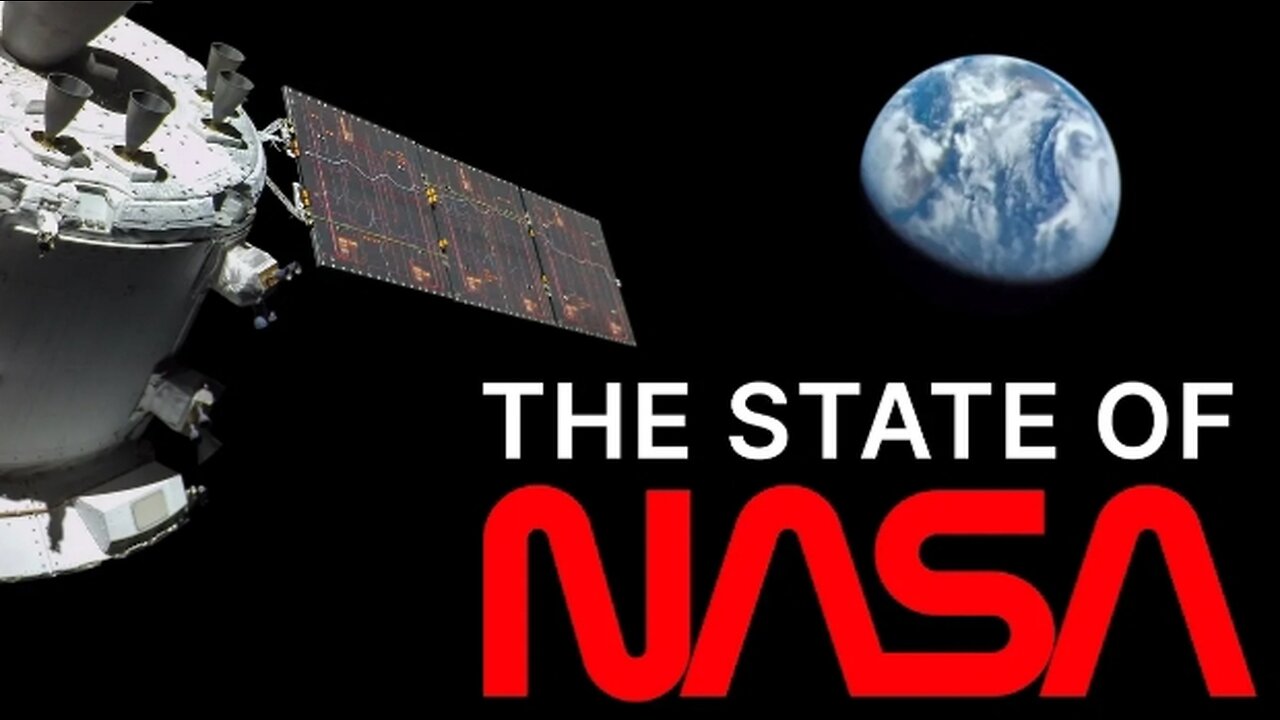Premium Only Content

2023 'State of NASA' Address from Administrator Bill Nelson
#NASA2023
#StateOfNASA
#MoonMarsExploration
#PlanetProtection
#AviationInnovation
#EconomicGrowth
#EquityInSpace
#InspireExploration
#NextGenExplorers
#BenefitHumanity
Ladies and gentlemen, distinguished guests, and fellow space enthusiasts,
I stand before you today as the NASA Administrator, Bill Nelson, to deliver the State of NASA address for the year 2023. It is an honor to share with you our ambitious plans and commitment to advancing space exploration, scientific discovery, and the betterment of humanity.
Our foremost objective is to chart a course for the Moon and Mars. Building on the successes of our Artemis program, we are steadfast in our resolve to return humans to the lunar surface by the end of this decade. The Artemis missions are more than stepping stones; they are a testament to our enduring spirit of exploration, laying the foundation for sustained lunar presence and eventual crewed missions to Mars.
In our pursuit of understanding the cosmos, NASA remains vigilant in monitoring and safeguarding our home planet. Earth science missions are integral to this effort, allowing us to study climate patterns, track environmental changes, and develop strategies to protect our planet for future generations. We are committed to addressing global challenges, collaborating with international partners to tackle climate change and foster a sustainable future.
Sustaining U.S. leadership in aviation and aerospace innovation is another pivotal aspect of our mission. NASA continues to push the boundaries of aeronautics, investing in cutting-edge technologies that enhance efficiency, reduce emissions, and pave the way for the next generation of air travel. From electric propulsion to autonomous systems, we are propelling aviation into a new era of sustainability and efficiency.
Economic growth is inseparable from our endeavors. As we explore the cosmos, we stimulate technological advancements that have far-reaching implications for industries on Earth. NASA's partnerships with the private sector catalyze innovation, creating jobs, and driving economic prosperity. We are committed to leveraging the space sector as an engine for economic growth, fostering a robust and competitive space industry.
Equity and diversity are foundational principles at NASA. We recognize the importance of fostering an inclusive environment that reflects the diversity of our nation. By promoting equal opportunities, we harness the unique perspectives and talents of individuals from all backgrounds. NASA is committed to breaking down barriers, ensuring that the benefits of space exploration are accessible to everyone.
Inspiring the next generation of explorers is at the heart of our mission. Through educational initiatives, outreach programs, and engaging experiences, we aim to ignite the spark of curiosity in young minds. By fostering a passion for science, technology, engineering, and mathematics (STEM), we empower the leaders of tomorrow who will carry the torch of exploration even further.
In conclusion, the State of NASA in 2023 is one of determination, innovation, and inclusivity. As we embark on bold missions to the Moon and Mars, monitor and protect our planet, drive advancements in aviation, and promote diversity and equity, we do so with the understanding that our endeavors extend beyond borders and benefit all of humanity. Together, let us continue reaching for the stars, inspired by the boundless possibilities that lie ahead.
More videos link
https://rumble.com/v3ym6lq-spacex-and-nasa-will-set-up-moon-base-this-is-how...html
https://rumble.com/v3ybqwc-scientists-have-found-most-horrible-planet-in-known-universe.html
https://rumble.com/v3yd8ee-celebrating-the-nasa-worm-on-this-week-nasa-november-10-2023.html
Thank you, and may the spirit of exploration guide us on this remarkable journey.
NASA, 2. Bill Nelson, 3. State of NASA address, 4. Moon exploration, 5. Mars exploration, 6. Planetary monitoring, 7. Earth protection, 8. U.S. leadership, 9. Aviation innovation, 10. Aerospace innovation, 11. Economic growth, 12. Equity and diversity, 13. NASA plans, 14. Space exploration, 15. Human spaceflight, 16. Lunar missions, 17. Martian missions, 18. Planetary protection, 19. Sustainability, 20. NASA initiatives, 21. Space agency, 22. Space policy, 23. Aerospace technology, 24. Moon missions, 25. Mars missions, 26. Environmental monitoring, 27. Earth conservation, 28. Leadership in space, 29. Space innovation, 30. Economic development, 31. Diversity in STEM, 32. NASA programs, 33. National space goals, 34. Lunar exploration plans, 35. Martian exploration plans, 36. Space research, 37. Future space missions, 38. Exploration strategy, 39. NASA vision, 40. Human space exploration, 41. Space leadership, 42. Aerospace advancements, 43. Lunar discoveries, 44. Mars discoveries, 45. Earth observation, 46. Space sustainability, 47. NASA achievements, 48. Human space settlement, 49. Planetary science, 50. Innovation in aviation, 51. Space technology, 52. Economic impact of space exploration, 53. Space industry, 54. Diversity in space programs, 55. NASA outreach, 56. Educational initiatives, 57. Next-generation explorers, 58. Space for humanity, 59. Space missions update, 60. Moon landing plans, 61. Mars colonization, 62. Environmental stewardship, 63. Earth protection initiatives, 64. Aerospace engineering, 65. Space cooperation, 66. International space collaboration, 67. Space diplomacy, 68. NASA partnerships, 69. Space science, 70. Scientific exploration, 71. Lunar habitat, 72. Mars habitat, 73. Earth sustainability, 74. Space exploration benefits, 75. Scientific research, 76. Space discovery, 77. NASA updates, 78. Mars rover missions, 79. Moon base development, 80. Space agency leadership, 81. Aerospace research, 82. Innovation in space technology, 83. Economic benefits of space programs, 84. Equity in space exploration, 85. Diversity in aerospace, 86. STEM education, 87. Space workforce, 88. Future space workforce, 89. NASA budget, 90. Space science advancements, 91. Planetary protection policies, 92. Sustainable space practices, 93. Space exploration policy, 94. NASA goals, 95. Moon colonization, 96. Mars settlement, 97. Earth monitoring initiatives, 98. Aerospace industry growth, 99. Space technology advancements, 100. Human settlement on Mars.
-
 LIVE
LIVE
Dr Disrespect
3 hours ago🔴LIVE - DR DISRESPECT - ARC RAIDERS - STELLA MONTIS QUESTS
3,368 watching -
 LIVE
LIVE
Sean Unpaved
2 hours agoJa'Marr Chase LIED About Spitting On Jalen Ramsey! | UNPAVED
190 watching -
 LIVE
LIVE
Side Scrollers Podcast
3 hours agoAsmongold vs DSP + Metroid Prime 4 CONTROVERSY + Disney DROPS DEI? + More | Side Scrollers
910 watching -
 41:53
41:53
Steven Crowder
4 hours agoEnd All SNAP Benefits | Change My Mind
324K454 -
 LIVE
LIVE
StoneMountain64
1 hour agoBlack Ops 7 ZOMBIES 1st Playthrough of the BIGGEST MAP EVER
94 watching -
 LIVE
LIVE
FusedAegisTV
16 hours agoFUSEDAEGIS | This is Going to Take GOTY | Expedition 33 PART II
84 watching -
 20:39
20:39
Professor Nez
1 hour agoNEW Epstein Leak Just Changed EVERYTHING!
6.6K8 -
 LIVE
LIVE
SilverFox
14 hours ago🔴LIVE - ARC Raiders - SilverFox x Grimm Hollywood - BETRAYAL DAY
95 watching -
 LIVE
LIVE
The Charlie Kirk Show
2 hours agoTrans Thomas Crooks? + Who Wants To Leave + Is Inflation Over?| Hassett, Emmons, Sec. Turner | 11.17
3,402 watching -
 56:51
56:51
The Rubin Report
3 hours agoOnline Outrage After Michelle Obama Tries to Play the Victim Card
77.7K60